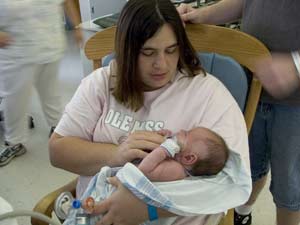Women with obesity face a higher risk of complications during childbirth compared to women of normal weight. This research was conducted by the British Journal of Obstetrics and Gynaecology.
 |
| Women with obesity face a higher risk of complications during childbirth (Image: main.uab) |
Researchers observed 8,300 women during their first childbirth, with one-third classified as obese. They found that the majority of obese cases required cesarean sections or the use of labor-inducing medications.
Experts indicate that this is a significant study and recommend that women at risk of obesity should lose weight before deciding to conceive. Individuals classified as obese have a Body Mass Index (BMI) over 30. To calculate BMI, one simply divides their weight in kilograms by the square of their height in meters. Over the past decade, the rate of obesity among pregnant women has doubled.
Complications
According to scientists, women with obesity not only face difficulties during childbirth but are also at increased risk of excessive bleeding, urinary tract infections, and shoulder dystocia during delivery.
For cases requiring cesarean sections, the risks are significantly higher compared to standard cases.
Moreover, most infants born to these women require special care and assistance in maintaining body temperature.
Dr. Talakere Usha Kiran, the lead researcher, stated that scientists still cannot accurately explain the causes of this phenomenon. She said: “We have identified this risk, and our next task is to find ways to mitigate it.”
Mr. Peter Bowen-Simpkins, a spokesperson for the Royal College of Obstetricians and Gynaecologists, noted: “Women with a BMI over 30 are at a higher risk of complications during and after childbirth. In difficult deliveries, doctors often resort to cesarean sections, but for obese women, this procedure becomes very challenging due to excessive abdominal fat.” He advises women to lose weight before deciding to conceive, as this remains the most effective solution available today.


















































